NJ PSYCHOLOGIST

A Publication of the New Jersey Psychological Association
In this issue...
Ethics: To Like or Not to Like - Psychologists and Social Media
Advocacy in 2019
Know Your Continuing Education Responsibilities
Graduate Student-Initiated Research Award Scholarship for Research on Diversity Issues: Women Warriors: Exploring the Various Dimensions of Female Service-Members’ Role Identities

Spring 2019 | VOLUME 69 | NUMBER 2
The Center for Psychotherapy and Psychoanalysis of New Jersey Contemporary Training and Continuing Education Opportunities in Psychodynamic Therapy, Psychoanalysis and Couples Therapy

CPPNJ Proudly Presents a Full Day Workshop (5 CEs) with Daniel Shaw, LCSW on Sunday, October 13, 2019
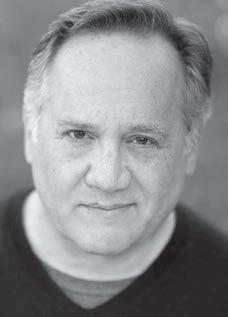
There’s still time to register for these Spring 2018 Mini-Courses and Weekend Workshop!
Traumatic Narcissism: Relational Trauma and Recovery
It’s time to sign up for our Fall 2019 courses, mini-courses and workshops!
15 Week Courses in CPPNJ’s Introductory Psychoanalytic Psychotherapy Program:
❖ Understanding Human Behavior Through a Psychoanalytic Lens: A Survey of the Theoretical Foundations of Psychodynamic Psychotherapy


❖ Psychoanalytic Ideas in Everyday Practice: Introduction to Clinical Process
5 Week Mini-Courses in CPPNJ’s NJ Couples Therapy Training Program:
❖ Managing Affairs: Clinical Models for Harnessing the Power of Infidelity

❖ Tapping into Body Wisdom: Use of Body Treatments in Couple Therapy
A Series of 7 Monthly Workshops in CPPNJ’s Supervision Training Program on:
❖ Psychodynamic Supervision: Theoretical Concepts and Clinical Applications
CPPNJ is a not-for-profit 501(c)(3) educational institute.


Daniel Shaw, LCSW, is a psychoanalyst in private practice in New York City and in Nyack, New York; and Faculty and Supervisor at The National Institute for the Psychotherapies in New York. His papers have appeared in Psychoanalytic Inquiry, Contemporary Psychoanalysis, and Psychoanalytic Dialogues, and most recently, his book, Traumatic Narcissism: Relational Systems of Subjugation, was published by Routledge for the Relational Perspectives Series.
Daniel Shaw presents a way of understanding the traumatic impact of narcissism as it is engendered developmentally, and as it is enacted relationally. Focusing on the dynamics of narcissism in interpersonal relations, Shaw describes the relational system of what he terms the ‘traumatizing narcissist’ as a system of subjugation – the objectification of one person in a relationship as the means of enforcing the dominance of the subjectivity of the other.
Understanding the relational system of the traumatizing narcissist allows therapists to help patients more clearly understand the nature of the subjugation trauma they have suffered. The workshop will illustrate Shaw’s theoretical premises with several case presentations, emphasizing the struggle for the adult child of the traumatizing narcissist to locate authentic subjectivity and restore trust in the validity of their subjective experience.
To find out more about our programs, workshops and courses, and to register, visit our website: www.cppnj.org Email cppnj@cppnj.org Call 973-912-4432 Find us at #CPPNJ1 Join us. Experience what we offer. Earn CEs in the process. CPPNJ
education
training
Mail CPPNJ, 235 Main Street #184, Madison, NJ 07940
is committed to being the
“go
to” place for psychodynamic continuing
and
in New Jersey – the place you can count on to expand and deepen your clinical skills.
Table of Contents
1 Who’s Who in NJPA 2019
2 President’s Message
3 Spring Forward in 2019
3 In Memoriam
4 Welcome New Members!
5 Ethics Update: To Like or Not to LikePsychologists and Social Media
6 NJPA Referral Network 2019
7 Legislative Update: Advocacy in 2019
10 Know Your Continuing Education Responsibilities
11 Save The Date
12 NJPA Foundation Grant Highlight!
13 NJPA 2019 Sustaining Members
14 Call for Nominations
15 Book Review: Return to Harmony: Conflict Management for Couples
16 Member News
17 APA Council Report
18 Poetry Corner
19 NJPAGS: “We’re More Than What We Produce”: Moving Beyond the Student Identity
20 Psychologist/Citizen of the Year
Who’s Who in NJPA 2019
www.PsychologyNJ.org
Editorial Board
Editor: Gianni Pirelli, PhD
Members:
Jack Aylward, EdD
Ashley Gorman, PhD
Eric Herschman, PsyD
Herman Huber, PhD
Maria Kirchner, PhD
Nathan McClelland, PhD
Anthony Tasso, PhD
Staff Liaison: Christine Gurriere
NJPA Executive Board
President: Morgan Murray, PhD
President-Elect: Luciene Takagi, PsyD
Past-President: Stephanie Coyne, PhD
Treasurer: Daniel DaSilva, PhD
Secretary: Mary Blakeslee, PhD
Director of Academic Affairs: Francine Conway, PhD
APA Council Representative: Rhonda Allen, PhD
Member-At-Large:
(A) Elio Arrechea, PhD
(A) Phyllis Bolling, PhD
(A) Daniel Lee, PsyD
(N) Randy Bressler, PsyD
(N) Alan Lee, PsyD
(N) Nicole Rafanello, PhD
Parliamentarian: Joseph Coyne, PhD
Affiliate Caucus Chair: Rosalie DiSimone-Weiss, PhD
ECP Chair: Michelle Pievsky, PhD
NJPAGS Chair: Christopher Thompson, MA, EdS
Latino/a Psychological Association of NJ Rep: TBD
Preparation of Manuscripts
All manuscripts submitted for publication should follow APA style. Manuscripts should be edited, proofread, and ready for publication. Please prepare your manuscript in a wordprocessing program compatible with MS Word using Times New Roman font in 12 point type, left flush. Please submit your manuscript via e-mail to NJPA Central Office and to Gianni Pirelli at e-mail addresses below.
Editorial Policy
Articles accepted for publication will be copyrighted by the Publisher and the Publisher will have the exclusive right to publish, license, and allow others to license, the article in all languages and in all media; however, authors of articles will have the right, upon written consent of the Publisher, to freely use of their material in books or collections of readings authored by themselves. It is understood that authors will not receive remuneration for any articles submitted to or accepted by the New Jersey Psychologist
Any opinions that appear in material contributed by others are not necessarily those of the Editors, Advisors, or Publisher, nor of the particular organization with which an author is affiliated.
Manuscripts should be sent to the Editor: Gianni Pirelli, PhD E-Mail: gpirelli@gmail.com or NJPA Central Office E-Mail: NJPA@PsychologyNJ.org
Published by: New Jersey Psychological Association
354 Eisenhower Parkway, Plaza I Suite 1150
Livingston, NJ 07039
973-243-9800 • FAX: 973-243-9818
E-Mail: NJPA@PsychologyNJ.org
Web: www.PsychologyNJ.org
New Jersey Psychologist (USPS 7700, ISSN# 2326098X) is published quarterly by New Jersey Psychological Association, 354 Eisenhower Parkway, Plaza I, Suite 1150, Livingston, NJ 07039. Members receive New Jersey Psychologist as a membership benefit. Periodicals postage pending at West Orange, NJ and additional mailing offices. POSTMASTER: Send address changes to New Jersey Psychologist, 354 Eisenhower Parkway, Plaza I, Suite 1150, Livingston, NJ 07039.
ABPsi Rep: TBD
CODI: Co-chairs Phyllis Bolling, PhD and Aida Ismael-Lennon, PsyD
Affiliate Representatives
Northeast Counties Association of Psychologists: Nansie Ross, PsyD
Essex/Union County Association of Psychologists: Susan Esquilin, PhD
Mercer County Psychological Association: David Krauss, PhD
Middlesex County Association of Psychologists: Tammy Dorff, PsyD & Rosalie DiSimone-Weiss, PhD
Monmouth/Ocean County Psychological Association: Tamara Latawiec, PsyD
Morris County Psychological Association: Randy Bressler, PsyD
Somerset/Hunterdon County Psychological Association: Janie Feldman, PsyD
South Jersey Psychological Association: Daniel Lee, PsyD
Central Office Staff
Executive Director: Keira Boertzel-Smith, JD
Director of Professional Affairs: Judith Glassgold, PsyD
Senior Communications Manager: Christine Gurriere
CE Coordinator: Ana DeMeo
Membership Services Coordinator: Jennifer Cooper
Spring 2019 1
PRESIDENT’S MESSAGE
Morgan Murray, PhD
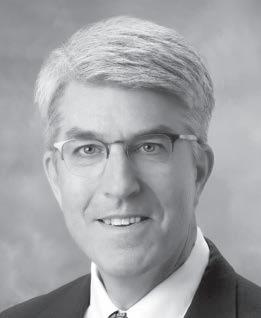
Irecently had the experience of attending the American Psychological Association’s 2019 Practice Leadership Conference (PLC) in Washington, DC (March 8-12). It is an opportunity to connect with, and learn from, other state association leaders from around the country. Last year I was grouped with presidents-elect that gave me a chance to engage with others who would likely face some of the same challenges that I would. Now, just a few months into my presidential year, I was back with these same peers from around the country to discuss this next phase of our amazing leadership journeys. What a great opportunity!
For me, the experience all began with the crew from my home state. The NJPA contingent for this weekend was great and added so much to the experience. Our delegation included Lucy Takagi as president-elect, who demonstrated her leadership on many NJPA committees and task forces. We had our Executive Director, Keira Boertzel Smith, who has taken on a very important leadership role within APA as the chair of the Council of Executives of State and Provincial Psychological Associations (CESPPA). Alex Gil, who is a doctoral student at Kean University, pastchair of NJPAGS and member of CODI, was our Diversity Delegate. Michelle Pievsky, also a past-chair of NJPAGS, current co-chair of our ECP Committee, and member of COLA, was our Early Career Delegate. Judith Glassgold, past-president of NJPA, joined us as our Director of Professional Affairs. We were also very fortunate that Sean Evers, a pastpresident of NJPA, and Virginia Waters, a member of COLA and CORA, were both present at PLC and contributed to the richness of the whole experience.
Our delegation contributed much to richness of the entire conference, as NJPA stood out at PLC. Keira, in her role as chair of CESSPA, was seated on the
President’s Message
dais for the large gatherings, and she also addressed the entire gathering on Monday morning. Lucy Takagi was encouraged by the conference leadership to nominate herself to be a member-at-large for the Committee of State Leaders (CSL), which she did, and won! She did this by speaking in front of a gathering for a town hall style election. It was great watching her win over the crowd with her message of inclusion. NJPA was further honored by the announcement of the $1000 award for our work toward changing our licensure law, that if successful, would allow people seeking licensure to earn all, or part, of the required hours of supervision prior to completion of the doctorate. Michelle Pievsky, Stacie Shivers, and our Early Career Psychologist Committee deserve tremendous credit for this accomplishment.
The conference was geared toward preparing us for leadership positions within our state associations. A very practical example of this was a workshop that I attended for executive directors and presidents. Keira and I heard from other executive directors and presidents about their experience of working together and we shared ours. The relationship between the executive director and president is key for the association to function smoothly. Not surprisingly, communication was emphasized. Keira and I spoke about our regularly scheduled time to speak each week and the nature of those communications. One thing that was emphasized in the workshop was that communication should be direct and honest, so that there are no surprises for either the executive director or president. Direct and regular communication builds trust. In this way, the workshop reinforced some important concepts for any relationship, but it was also a reminder not to take important relationships for granted and to keep communicating.
The leadership focus of the conference was called “Integrated Advocacy.” State leaders of associations are all in a position to advocate for psychology and psychological practice. This integrative focus was evident in the titles of some of the workshops: “Building Bridges and Tearing Down Walls: A Model for Empirically-
Based State and Legislative Advocacy on Immigration,” and, “A State Toolkit for Integrated Care.” In these and other workshops, a current issue within the scope of psychological expertise and practice was discussed at length with attention given to the legislative and advocacy dimension. In the case of the two workshops just mentioned, NJPA currently has initiatives in both areas: our Integrated Care Task Force, and our Immigration Emergency Action Group.
The weekend finished with our visits to Capitol Hill to advocate for psychology with our New Jersey elected representatives. APA provided information on the bills they wanted us to support. On this day we advocated for a Medicare bill that would add psychologists to the Medicare definition of physician, and another bill that would expand the use of Telehealth services, so that patients could be in their homes to receive Telehealth services and would not be required to be in a doctor’s office. Advocacy of this kind is crucial to professional psychology and to the public’s access to care. Another benefit going forward is that we begin to establish relationships between NJPA and our members of Congress. We plan to make similar efforts with state representatives.
The conference was a big success, the benefits of which I hope will be felt by NJPA members as we return to put our learning to practical use in our stewardship of the association. It was a fun experience and in speaking about it here, I hope it might spark an interest in members to consider getting involved with NJPA, either in leadership or as a committee member. I realize NJPA needs to invest in our future leaders through a process that supports and prepares them for these roles. A number of states have leadership academies for just this purpose. Ohio Psychological Association created a successful leadership development program, and I was able to speak to Katherine Oh, president of OPA, to learn more about it. It is my plan to initiate the effort to establish a similar process to prepare future NJPA leaders. In the meantime, we welcome the involvement of all our members!! ❖
New Jersey Psychologist 2
Spring Forward in 2019
Keira Boertzel-Smith, NJPA Executive Director

From March 6 – March 12, 2019, NJPA was present in Washington, DC at the American Psychological Association (APA) Pre-Practice Leadership Conference meetings and the Practice Leadership Conference (PLC). Attending this year were NJPA delegates Drs. Morgan Murray, NJPA president; Lucy Takagi, NJPA presidentelect; Judith Glassgold, NJPA DPA; and Michelle Pievsky, NJPA ECP delegate; along with Alex Gil, NJPA diversity delegate; Keira Boertzel-Smith, NJPA executive director; and friends, Drs. Sean Evers and Virginia Waters.
PLC is the annual advocacy and leadership training conference for leaders in professional psychology practice. Each year, APA offers programming and opportunities designed to educate, connect, and empower APA and state, provincial, and territories’ representatives. The goal is for the attendees to leave PLC with new information, resources, and skills needed to be effective and creative advocates aware of the latest trends and developments in psychology and health care policy.
This year, I began my time in Washington, DC hosting the Council of Executives of State and Provincial Psychological Associations (CESPPA) meetings in my role as the 2019 CESPPA chair. CESPPA has 60 members made up of the executives of state, provincial, and territorial psychological associations (SPTAs). Our CESPPA pre-PLC meetings focused on the professional development of CESPPA’s executive members, development of all state, provincial, and territorial affiliate associations, and state and federal advocacy issues of importance to SPTAs and APA. New this year, CESPPA ended the meetings with
an executive director and presidents’ workshop: Collaborative Leadership Workshop: EDs & Presidents Working Together in 2019. The executive directors and presidents had a great discussion and explored how we can build successful partnerships together in order to create success for the SPTAs. It was also a chance for the presidents to network with each other, share their goals for their presidential year, and discuss their experiences during the first few months of their term. The feedback was great, and CESPPA will try to incorporate president-elects next year too.
On March 9, 2019, PLC began. New for 2019 was the launch of APA Services, Inc. and the inauguration of APA’s new integrated advocacy structure. As APA enters a new era and begins implementing a strategic plan approved by APA’s Council of Representatives at their February 2019 meeting, PLC presented an opportunity to examine psychology’s future and the discipline’s advocacy efforts. Attending PLC was a mix of leadership communities such as delegates, executives, and staff from the SPTAs, the APA Board of Directors, members of APA’s Advocacy Coordinating Committee, representatives from the Education, Public Interest, Science, and Applied Psychology communities, and executives and staff from APA. There was great energy and exchange of ideas again this year. NJPA members began the PLC with a plenary session on Inside Congress and the 2020 Yr Political Landscape with David Wasserman, House Editor and Political Analyst for The Cook Report. We went onto attend two days of workshops on issues important to psychologists, such as legislative advocacy on immigration, integrated care, Medicaid, HIPAA 2019, and maximizing our state advocacy impact.
Highlights from the 2019 PLC: NJPA gained positive attention for sending Alex Gil, a doctoral student, as our Diversity Delegate; the APA Committee on Early Career Psychologists recognized NJPA for efforts to count practicum hours for licensure; I had the thrill of
presenting CESPPA’s Monday morning Leadership Plenary Session to the full PLC audience; and NJPA PresidentElect, Dr. Lucy Takagi, was elected in as an APA Committee on State Leadership Member-at-Large. We cheered each other on loudly!
We ended our time in Washington, DC with a trip to Capitol Hill. Our delegation met with the following New Jersey representatives and senator’s offices to discuss cosponsoring two bills that remove barriers to quality mental health access for Medicare patients, HR884 and HR1301, and preserving mental health and substance use disorder coverage in Medicaid and private health insurance plans under the ACA. Lastly, we enjoyed having a dialogue with them about important social advocacy issues. Rep. Tom Malinowski (D-NJ-07); Rep. Jeff Van Drew (D-NJ-02); Rep. Andy Kim (D-NJ-03); Rep. Mikie Sherrill (D-NJ-11); Rep. Frank Pallone (D-NJ-06); Rep. Bill Pascrell (D-NJ-09); and Sen. Bob Menendez (Senator D-NJ). ❖
Philip Bobrove, PhD
NJPA Member, 50 years
Jerome Gordon, EdD
NJPA Member, 34 years
Louise Riscalla, PhD
NJPA Member, 52 years
Cheryl Thompson, PhD
NJPA Member, 33 years
Spring 2019 3
In Memoriam
Licensed 5 yrs or more
Tricia Casey, PsyD
Christian Davis, PhD
Yesenia Flores, PsyD
Nancy Friedman, PhD
Sara Marvin, PhD
Leslie Newport, PsyD
Joshua Shifrin, PhD
Stella Silver, PsyD
Nancy Talbot, PhD
Raymond Terranova, PhD
Licensed 2-5 yrs
Debra Drucker, PhD
Lia Postorino, PsyD
Kathleen Boss, PsyD
WELCOME NEW MEMBERS!
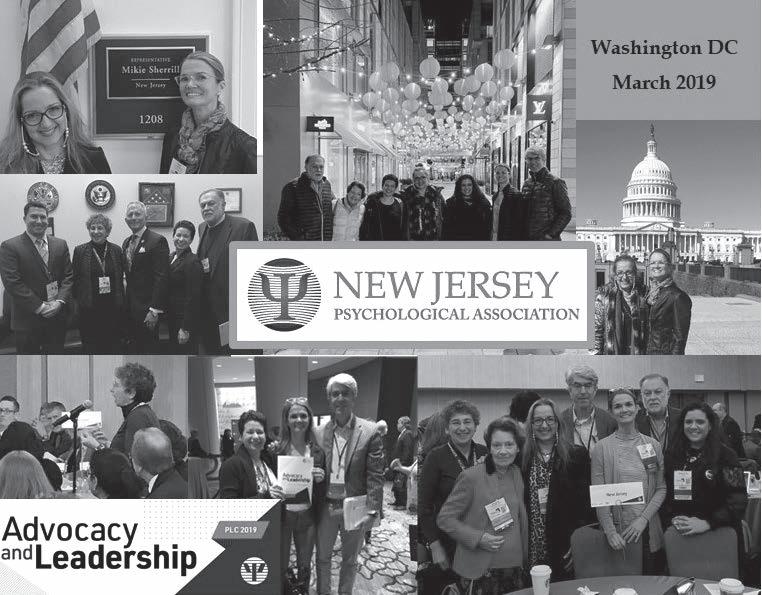
Tina Chen, PhD
Caitlin Colandrea-Tuohy, PsyD
Jessica DeGaetano, PsyD
Philip Drucker, PhD
Licensed less than 2 yrs
Christine Karounos, PsyD
Pamela LiVecchi, PsyD
Maria A. Staropoli-Hafner, PsyD
Non-licensed doctoral degree
Earta Norwood, PhD
Associate Member
Toni Davis, MA
Student
Denzel Bridges, BA
Danika Charles, BA
Jessica Cowan, MA
Amanda Wagner, MA
Carl Papandrea, MA
Francois Diouf, PsyD
Samuel Golden, PsyM
Priti Pandya-Patel, MS
Tamara Quezada, BS
Emily Sauer, BA
Sharron Spriggs, MA
Tali Wigod, MS
Katelyn Yunes, MS
New Jersey Psychologist 4
To Like or Not to Like - Psychologists and Social Media
Sandra Ackerman Sinclair, PhD
Over the last 35 years, we’ve seen the invention of the Internet (1983; Andrews, 2013), Google (1998; “From the Garage,” n.d.), Facebook (2004; Phillips, 2007), Twitter (2006; Arthur, 2010) and many other technological and social media-based platforms that have both enhanced and challenged our practice of psychology. Technology and social media are nearly impossible to avoid. Almost everyone utilizes email, texts, or has a private or professional social media account. Maybe you write a blog on your professional website, or use unencrypted email or text to communicate with clients.
As a result, virtually everyone has some digital footprint. Go ahead, Google yourself – what comes up? How would you feel if a client came across that information? How does online information about us impact therapy when accessed by clients? Despite our best intentions, we may unwittingly risk ethical violations, with potential negative consequences for our clinical work or our professional license. Technology and social media are ubiquitous, and this article won’t help you learn to erase your likely ever-expanding digital footprint, or teach you how to “go stealth.” But maybe it can serve as a reminder that being mindful of how we manage both our personal and professional online personas can help avert potentially awkward, or even damaging collisions of these two preferably separate worlds. This article further highlights some of the ways psychologists can protect themselves against inadvertent ethical breaches in this increasingly complex virtual age.
It is critical to consider the ways in which technology and social media have challenged our field. Our ability to maintain confidentiality (APA Ethics Code, Standard 4.01), avoid multiple relation-
ships (APA Ethics Code, Standard 3.05), especially multiple virtual relationships, and ensure our clients are engaging in services with fully informed consent (APA Ethics Code, Standard 10.1) are all ethical concepts that require added attention as we advance our field to keep pace with technology.
Confidentiality is a cornerstone of psychotherapy. According to Campbell et al., (2010) “Confidentiality means that nonpublic information about a person will not be disclosed without consent or special legal authorization. It is a promise of psychologists to keep information private about the persons with whom they work” (p. 124). However, a simple email or text with a client (when unencrypted and therefore susceptible to being hacked) may unintentionally violate this ethical standard. Clients may not be aware that any subject matter in an email or text can impact their confidentiality.
Allowing clients to become a “fan” or “follower” of a professional blog or Twitter handle can threaten this ethical standard as well. Clients may not realize that they are creating a potential public link to your practice. This action may impact the therapeutic relationship and/or affect their confidentiality.
Consider the methods by which you choose to virtually communicate and interact with clients. How private are your privacy settings? Psychologists can use encrypted options for a variety of digital communication (e.g., Hushmail for email). But communication from clients via email, text, or direct message through a social media account (e.g., Facebook, Instagram, Twitter) can happen inadvertently. A potential or existing client may search for you online and find a public account on LinkedIn or Facebook. They may “like” a blog post or request to be connected. Checking privacy settings on each of your accounts and ensuring that the content on your page is appropriate for all viewers, both personal and professional, are ways to limit risk. Learning about online security, encryption, and privacy can feel overwhelming, especially for those of us who may not be as technologically savvy. Consider hiring a digital consultant,
or seek out a trusted and knowledgeable colleague, family member, or friend who can explain the correct settings and help create appropriate boundaries for your online presence. As we’ve seen in recent news headlines involving Facebook, WhatsApp, & SnapChat, privacy settings on social media platforms do not equal encryption or guarantee that information will not become public.
While I cannot erase the fact that I was a college athlete and public statistics exist online from those glory days, I can ensure that my personal Facebook page is “not searchable.” Having said that, I regularly discover personal information online that I’d prefer to keep private (i.e., home address). This particular information often pops up on “business listings” that I never created. These business listings can seem like an invitation for clients to review our services, a potential breach of APA Ethics Code, Standard 5.05 that specifies that psychologists do not solicit testimonials from clients/patients. It can often feel as if technology is working against us.
To protect ourselves, many psychologists adopt a “social media policy” as part of their informed consent (APA Ethics Code, Standard 10.1). A social media policy outlines the ways in which you will manage a variety of potential online interactions with clients. These include refraining from activities such as friending or following on social media platforms, using search engines to learn about client’s backgrounds, or using unencrypted email for communication, for example.
Keely Kolmes (2010) shares her social media policy online, and documents more broadly the ways in which psychologists can remain mindful of navigating the technological age in clinically and ethically savvy ways. Whether your online presence is minimal or vast, consider adding a policy of this nature to your initial paperwork and reviewing it with every client. Doing so may prevent a clinical rupture as therapy progresses. Just as we habitually discuss with clients what may happen if we see one another outside of therapy, having a conversation about how an online encounter will be handled is equally vital.

Winter 2019 5 To
ETHICS UPDATE
Technology is complicated. While this article is by no means exhaustive, it attempts to highlight a few of the ways psychologists can sharpen their awareness in this technological age. It is nearly impossible to be a “blank slate,” so let’s just make sure our slate is as professional and ethical as possible. ❖

References
American Psychological Association. (2017). Ethical principles of psychologists and code of conduct (2002, Amended June 1, 2010 and January 1, 2017). Retrieved from https://www. apa.org/ethics/code/.
Andrews, E. (2013). Who Invented The Internet. Retrieved from https://www. history.com/news/who-invented-theinternet.
Arthur, C. (2010). How Twitter Was Born: The First 140 Users. The Guardian. Retrieved from https://www.theguardian.com/technology/blog/2010/ jan/11/twitter-first-140-users-history.
Campbell, L., Vasquez, M., Behnke, S., & Kinscherff, R. (2010). APA Ethics Code Commentary and Case Illustrations. Washington, D.C.: American Psychological Association.
Kolmes, K. (2010). Social Media Policy. Retrieved from http://drkkolmes.com/ social-media-policy/#.XC_LRlxKg2w (n.d.). From The Garage to the Googleplex. Retrieved from https://www. google.com/about/our-story/.
Phillips, S. (2007). A Brief History of Facebook. The Guardian. Retrieved from https://www.theguardian.com/ technology/2007/jul/25/media.newmedia
NJPA Referral Service
NJPA Referral Service
Operating in an upgraded website platform user friendly, visually pleasing, and expanded fields to select from!
Operating in an upgraded website platform user friendly, visually pleasing, and expanded fields to select from!
Let New Jersey residents find YOU for their mental health needs by joining the NJPA Referral Service!
Let New Jersey residents find YOU for their mental health needs by joining the NJPA Referral Service!
Find a Psychologist is the most visited webpage at www.psychologynj.org racking up over 15,000 visits in 2018!
Find a Psychologist is the most visited webpage at www.psychologynj.org racking up over 15,000 visits in 2018!
Our unique ability to match not only insurance providers, but other specific criteria such as evaluators, foreign language fluency, specialized services, specific orientations, and more, makes us the go-to place for mental health referrals in New Jersey! This is a great opportunity to grow your practice
Our unique ability to match not only insurance providers, but o ther specific criteria such as evaluators, foreign language fluency, specialized services, specific orientations, and more, makes us the go-to place for mental health referrals in New Jersey! This is a great opportunity to grow your practice.
Visit www.psychologynj.org and log in to the Members Only section to fill out the form and complete your profile. Instructions can be found there to assist you.
Have you already joined the network?
Visit www.psychologynj.org and log in to the Members Only section to fill out the form and complete your profile. Instructions can be found there to assist you.

If so, please review your listing to make sure it is up-to-date and reflects your areas of expertise and practice criteria.
Have you already joined the network?
If so, please review your listing to make sure it is up-to-date and reflects your areas of expertise and practice criteria.
Annual Fee: $120
Newly Licensed/New Member Fee: $60
Sustaining Member FREE!
Annual Fee: $120
Newly Licensed/New Member Fee: $60
Sustaining Member FREE!
New Jersey Psychologist 6
Advocacy in 2019
may complete at least two years of full time professional experience in the practice of psychology under the supervision of a licensed psychologist or of one clearly eligible for licensure in the opinion of the board, prior to receiving the requisite degree. Current law requires applicants to complete at least one of the two required years of full time professional employment subsequent to the receipt of the requisite doctoral degree. The APA Committee on Early Career Psychologists recognized NJPA for efforts to count practicum hours for licensure.
Duty to Warn Law – NJPA in Trenton
dures. NJPA looks forward to being on the Attorney General’s Duty to Warn Law Workgroup to address the details about the law amendments.
Summary of the Duty to Warn Law -
There are a lot of changes occurring in COLA recently. We are looking at how to further integrate COLA with the NJPA executive board. We had ongoing efforts to have membership become more informed and more involved in the process of legislative advocacy. Information was already presented in Friday updates and email blasts. Look for additional announcements throughout this year and onward. NJPA will continue to work on enhancing our member advocacy communication, and trying to find the best communication format and system. This is a challenge because the NJPA Committee on Legislative Affairs (COLA) is currently following over 300 bills and COLA reviewed 22 bills at its last meeting. Bills are flagged by our Government Affairs Agent and brought to COLA’s attention by our members and the Board of Psychological Examiners. We are considering ways for members to have access to these bills. All New Jersey bills can be viewed at <https://www.njleg.state.nj.us/>
Here are some of the current “Hot Topics” that COLA is working on:
Bill A5307
– Licensure Act
Legislation –Revising psychologist training requirements and amending P.L. 1966, c.282.
Assemblywoman Angelica Jimenez is sponsoring our bill that proposes to amend the training requirements for psychologists. The bill provides that persons applying to the State Board of Psychological Examiners after January 1, 2020 or 6 months after passage, whichever is sooner,

On March 20, 2019, COLA Chair, Dr. Barry Katz, and NJPA Executive Director, Keira Boertzel-Smith, NJPA Government Affairs Agent, Jon Bombardieri, a representative from the NJ Hospital Association, and a representative from Robert Wood Johnson, attended a meeting at the New Jersey Attorney General’s Office in Trenton to discuss the amendments to the Duty to Warn bill. Our association closely followed the bill development over the years. We provided the bill sponsors with suggested amendments to ensure that the bill protects the public while allowing for the most efficient and effective way to implement an additional public safety provision related to duty to warn. Our suggested amendments were focused on ensuring that the motivation of the public to seek mental health care was not stifled or deterred in any way by a fear that sensitive information would be disclosed to police departments where patients live. We also wanted to encourage and allow for mental health providers to provide services without concern that patients might be less forthcoming during sessions. In addition, we wanted to address the best manner in which mental health providers communicate with law enforcement and under what circumstances.
Now that the Duty to Warn amendment has become law, the purpose of the meeting was to draw the Attorney General’s attention to a few items that are unclear in the new law language and to assist in developing appropriate proce-
Many psychologists are familiar with the original 1991 New Jersey Duty to Warn Law, (9P.L.1991, Chapter 270) that requires mental health practitioners to take at least one of five actions, when the patient communicates a threat of imminent, serious physical violence against a readily identifiable individual or against himself, or that a reasonable professional would believe the patient intended to carry out such an act. The 2018 amendment to the law, signed by Governor Phil Murphy (along with 5 other gun control bills) on June 13, 2018, adds to the existing duty to warn law by requiring in general that, in addition to the actions and condition spelled out in the original 1991 law, notify the chief law enforcement officer or the Superintendent of State Police if the patient resides in a municipality that does not have a full time police department that a duty to warn and protect has been incurred with respect to the patient and shall provide to the chief law enforcement officer or superintendent, as appropriate, the patient’s name and other nonclinical identifying information. The chief law enforcement officer or superintendent, as appropriate, shall use that information to ascertain whether the patient has been issued a firearms purchaser identification card, permit to purchase a handgun, or any other permit or license authorizing possession of a firearm and/or will determine if they have access to firearms. You can read more about this law on the NJPA website or here <https://www.njleg.state.nj.us/2018/ Bills/PL18/34_.PDF>.

NJPA attended the 2019 Mental Health Stakeholder Forum
On March 27, 2019, COLA Chair, Dr. Barry Katz, NJPA Executive Director, Keira Boertzel-Smith, and COLA member, Jeffrey Axelbank, PsyD and the following organizations were invited to the 2019 Mental Health Stakeholder Forum hosted by the New Jersey Psychiatric Association -
Winter 2019 7
Committee on Legislative Affairs Chair, Barry Katz
LEGISLATIVE
NJPA Executive Director, Keira Boertzel-Smith
AGENDA
Eastern Pennsylvania and Southern New Jersey Council of Child and Adolescent Psychiatry
Medical Society of New Jersey
Mental Health Association in New Jersey
National Alliance on Mental Illness of New Jersey
National Association of Social Workers –New Jersey Chapter
New Jersey Association of Health Plans
New Jersey Association of Mental Health and Addiction Agencies
New Jersey Chapter American Academy of Pediatrics
New Jersey Council of Child and Adolescent Psychiatry
New Jersey Hospital Association
New Jersey Psychological Association
New Jersey Society of Addiction Medicine
Although the forum was meant to be an informal networking session, each organization shared their association materials, including advocacy efforts. The forum was held to collaborate on behalf of the citizens of New Jersey, whom we all serve.
Here are some of the most recent bills that COLA is reviewing:
S423/A4889 Requires assessments prior to laboratory and diagnostic testing of persons undergoing mental health screening.
S3256/A4643 Requires certain officers of education organizations to sign acknowledgement and undergo training concerning duties to report child abuse.
S3278/A4926 Requires DOC to provide prenatal and post-partum education and services for certain inmates.
A4757/S3241 Directs Division of Medical Assistance and Health Services to collaborate for purposes of evidence-based policy review; makes an appropriation.
A4761/S3201 Revises certain aspects of out-of-network arbitration process under the “Out-of-network Consumer Protection, Transparency, Cost Containment and Accountability Act.”
A4767 “Integrated Co-occurring Treatment Facility Construction Bond Act,” authorizes bonds for $100,000,000 for facilities that treat substance abuse and psychiatric disorders, and appropriates $5,000.
A4768 Clarifies DHS authority over sober living homes, and requires certain sober living homes to be dedicated for use by persons in substance use recovery who have other mental health disorders.
A4776/S930 Requires primary care physicians, when developing or supplementing patient’s medical history, to check prescription monitoring information and make verbal inquiries about patient’s personal and familial experience with substance use disorders.
A4804/ S3303 Requires Medicaid cover professional violence prevention counseling services.
S3288 Requires DOE to define expenditures for behavior modification at approved private schools for students with disabilities as allowable instructional cost for purposes of tuition rate setting.
S3326/A4825 Amends law to extend length of postpartum coverage for certain Medicaid services for eligible pregnant women to 90-day period.
S3292/A4638 Extends transmittal date deadline for fiscal year 2019-2020 gubernatorial budget message to Legislature from fourth Tuesday in February to March 5, 2019.
A4871 Prohibits attempts by mental health professionals to change sexual orientation of adults.
A4939/S3372 Requires DOH to develop interconception care resources to enhance postpartum care for women.
AR217/SR122 Respectfully urges FDA to finalize rule banning electrical stimulation devices used in treatment of aggressive or self-injurious behavior.
S3371/A4940 Directs DOH to develop standardized perinatal health curriculum for community health workers.
S3351/A4613 Prohibits pre-approval or precertification of medical tests, procedures and prescription drugs covered under health benefits or prescription drug benefits plans.
S3364/A4937 Requires DOH to identify and take appropriate steps to secure federal sources of funding to support maternal mental health.
S3365/A4932 Establishes perinatal episode of care pilot program in Medicaid. S3368 Revises requirements for provision of counseling and support services to emergency services personnel.
S3376/A4938 Requires DOH to establish “My Life, My Plan” program to support women of childbearing age in developing reproductive life plan.
A4954/S3368 Revises requirements for provision of counseling and support services to emergency services personnel. Homeland Security and State Preparedness
A4952/S3399 Prohibits MVC from charging fee for restoring driver’s license suspended due to mental or physical condition.
A5065/S3466 Provides that New Jersey residents have access to one cost-free postpartum home visit.
S3542/A4887 Establishes task force to examine public school programs and services designed to address student mental health.
We encourage all members to learn more about NJPA’s Legislative Advocacy Efforts.
You can find the COLA Meeting Minutes and Operations Manual on the NJPA website under the Members Only section under Ongoing Committees<https://njpa.memberclicks.net/ongoingcommittees>. As always, members are encouraged to submit concerns and ideas to the NJPA central office. We would also like to encourage members to consider applying for COLA and to take an active role in advocating for our profession and the work that we do. ❖
New Jersey Psychologist 8
FOLLOW US!
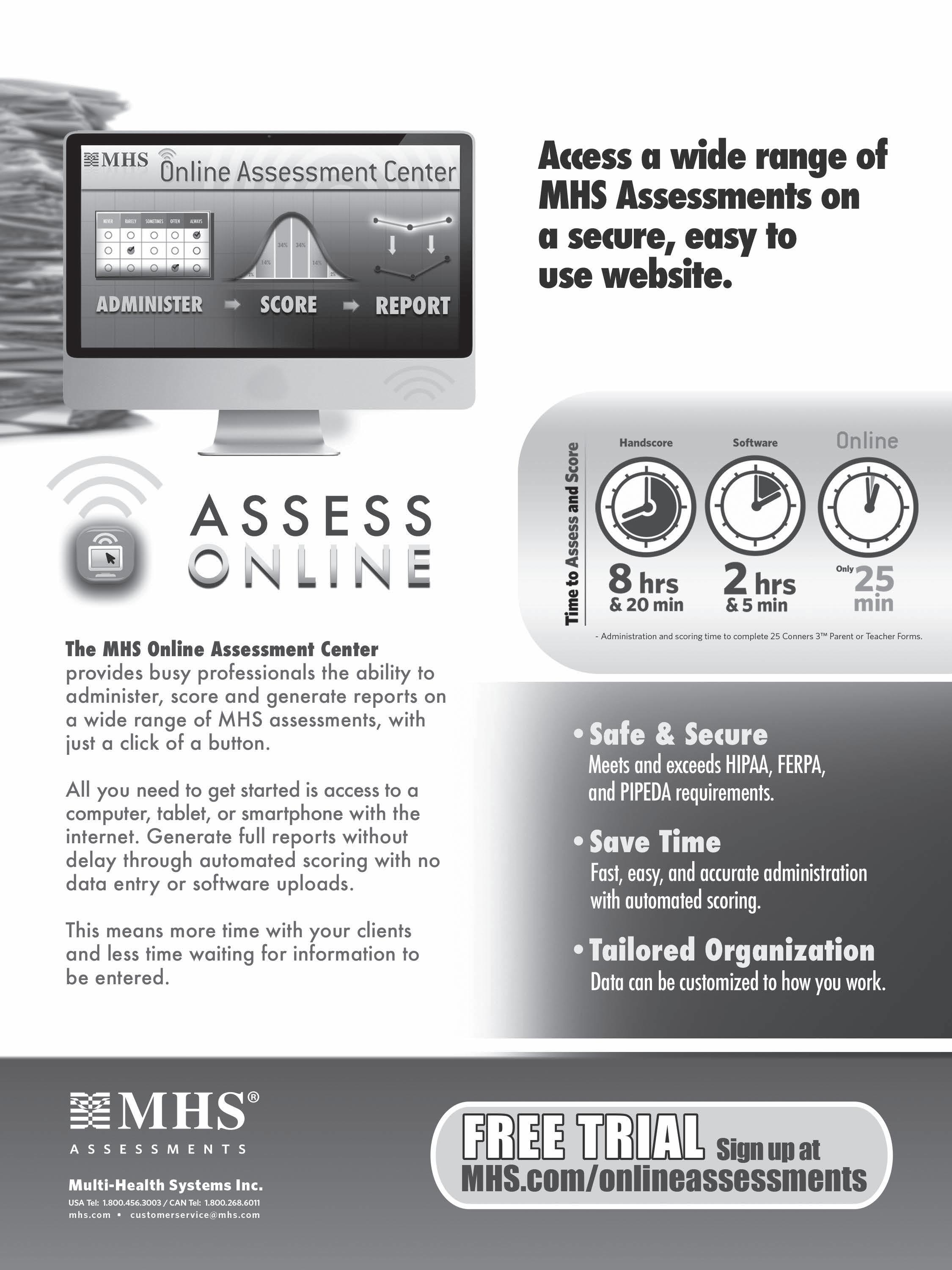
Winter 2019 9
Know Your Continuing Education Responsibilities
date with New Jersey Mandatory CE, NJPA created a Council on Continuing Education Affairs (COCEA). This council is charged with developing at least 20 credits per year of robust CE programming in the form of stand-alone programs, annual conferences, grand rounds, and live and recorded webinars. The council hosts three committees charged with soliciting and vetting potential speakers for (stand-alone) programs, conferences, virtual home study learning, and CE approval for these programs.
for their first biennial renewal shall not be required to indicate that they completed continuing education requirements.
In November 2015, Governor Christie signed into law A2714/S1993 that requires continuing education for licensed practicing psychologists. The law indicates the NJ Board of Psychological Examiners (BoPE) shall create standards for continuing psychology education and accredit education programs offering credit toward continuing psychology education or recognize organizations that may accredit education programs and it shall take effect on the 360th day following the enactment date of November 9, 2015. The final Division of Consumer Affairs State Board of Psychological Examiners (BoPE) Regulations were published on June 19, 2017 in the New Jersey Register. In June 2019, licensees will be required to sign an attestation that they have completed their continuing education (CE) requirements to renew their license. Some licensees will be audited and required to show documentation of their completion of continuing education credits.

NJPA is approved by the American Psychological Association to sponsor continuing education for psychologists, both live and virtual. Therefore, NJPA programs will count towards the New Jersey mandatory continuing education requirements.
In our continued pursuit of being up to
The three committees are as follows: Live Events Committee, Home Study Committee, and the CE Approval Committee. The Live Events Committee finds presenters and then works with the presenters to provide NJPA with a completed proposal for CE approval. Committee members also plan and prepare for our large conferences. The Home Study Committee plans and prepares virtual learning programs for NJPA, as well as CE reading activities in the NJ Psychologist. Committee members work with potential instructors to provide NJPA with a finalized proposal for CE approval. The CE Approval Committee reviews completed CE applications to determine if they meet APA CE standards. COCEA is seeking volunteers to serve on one of the three committees. We hope members join and take part in helping to determine our presenters and topics for our continuing education.
COCEA hosted its first annual retreat on March 1, 2019. The retreat enables COCEA members and invited guests to explore and discuss general, comprehensive, and long-term issues including developing a CE business model, infusing diversity into our continuing education, and planning and organizing our CE calendar and programming. The Council meets five times a year and committees meet on a regular basis, often virtually, to allow for easier and greater member participation.
Continuing Education Requirements
For each biennial license renewal, a licensee must have completed 40 credits of continuing education related to the practice of psychology. These 40 credits must include at least four credits in topics related to domestic violence. The next renewal is June 2019. Licensees applying
The Board of Psychological Examiners advised NJPA that domestic violence would be interpreted broadly to include, but not be limited to, treatment issues for survivors of violence, family protection and other related issues. If you have any questions about a particular program, you may contact the Board of Psychological Examiners at 973-504-6470 to see if it will count as a domestic violence course.

Please note – In January 2018, an amendment was made to BoPE Statutes 45:14B-47. Continuing education for certain practicing psychologists, paragraph (f) continuing education required pursuant to this section shall include at least one credit of educational programs or topics concerning prescription opioid drugs, including the risks and signs of opioid abuse, addiction, and diversion. L.2015, c.131, s.1; amended 2017, c.341, s.7. NJPA’s Government Affairs Agent was told by the Board of Psychological Examiners that this one credit requirement will not need to be met/completed for the June 2019 license renewal. The BoPE current regulations on continuing education are silent on the requirement for the one credit in prescription opioid drugs and the BoPE did not yet put out a notification to New Jersey psychologists because the statutes change came in 2018, in the middle of this licensing period. NJPA is awaiting more information from the BoPE about this statute change.
All continuing education courses must be approved by one of the four organizations listed below, or by a provider approved by one of the four organizations listed below. At least 20 of the 40 credits, if not all, must be completed by attending continuing education courses, in- person or on-line, or through reading and examination. For those psychologists involved in training, teaching, presentation, and scholarly activities, up to 20 of the 40 credits can be from completing a graduate course from a regionally accredited school, college or university, authorship of an article,

New Jersey Psychologist 10
Events & Continuing Education Coordinator, Ana DeMeo
NJPA BoPE Liaison, Dennis Finger, EdD
NJPA Executive Director, Keira Boertzel-Smith
presenting a new lecture or seminar, or teaching or developing the curriculum for a new course. All of these options must be related to the practice of psychology. Note that the graduate course does not have to be from an APA accredited psychology program. Just auditing a graduate course will not qualify for continuing education credit. Please carefully review the regulations to learn more.
Of the 40 credits, at least 10 credits shall be in approved courses or programs where there is opportunity for live interaction with the continuing education instructor.
In New Jersey, Who Are Approved Sponsors of Continuing Education Courses?
Any of the below four or organizations/ providers approved by at least one of the fourAmerican Psychological Association; National Register of Health Service Psychologists; Association of State and Provincial Psychology Board; or American Medical Association.
If a continuing education program is not presented directly by one of the four organizations listed above, call the organization providing continuing education to see if they are approved by one of the four to provide continuing education credit. The American Psychological Association requires that a disclaimer be placed on the program flyer indicating American Psychological Association approval.
New Jersey Psychology Association (NJPA) is approved by the American Psychological Association to sponsor continuing education for psychologists. NJPA maintains responsibility for this program and its content.”
If licensed psychologists have completed more than the minimum continuing education credits in any
biennial period, they can carry up to 10 credit hours into the succeeding biennial period. Waivers of continuing education for the identified biennial period are granted on an individual basis for reasons of hardship such as severe illness, disability or military service. Waivers are not granted based age, years licensed, or years of experience. A licensee seeking a waiver needs to apply to the BOPE in writing at least 90 days before the license renewal.
Documenting your Continuing Education Credits
You must maintain your continuing education documentation for four years after completion. Course work and other means of accumulating CE credit must be specifically documented as spelled out in the regulations. For example, a transcript is required from your school, college, or university to document successful completion of a graduate course. For every biennial license renewal, you shall attest that you have completed your continuing education requirements and the Board of Psychological Examiners will perform random audits of licensees to determine compliance with continuing education requirements. It is very important that you create a tracking system for yourself. Do you have a hard copy binder of your documentation or an e-folder of your continuing education documentation? Get organized today!
What If I Am Unsure About My Credit?
You may contact the Board of Psychological Examiners if you have a question about whether a course or alternative credit source is appropriate. 973- 504-6470. Alternatively, you can find answers to frequently asked questions here <https://www.njconsumer affairs.gov/psy/Pages/FAQ.aspx> ❖
License period June 2019 – June 2021 (40 credits, 4 of which are DV and 1 in Opioid Education)
Treating Substance Use Disorders
Practical Applications of Neuropsychological Testing
Spring 2019 11
Date of CE Course: Title, Name Alternative CE Activities Hard Copy/ Completion of CE Sponsor, Location, [see BoPE Regs: Electronic copy # of CE Course 13:42-10.21 (b)] of certificate ( ) S a v e t h e D a t e ! 2 0 1 9 C E P r o g r a m s N J P A C o n f e r e n c e s R e g i s t r a t i o n O p e n ! D o m e s t i c V i o l e n c e J u n e 7 F a l l C o n f e r e n c e N o v e m b e r 1 & 2 H o m e s t u d y L i b r a r y Firearms and Domestic
Law
& Correctional
Violence-Related Considerations in Military,
Enforcement,
Populations
in our Homestudy
www psychologynj org Details to Come!
Available online
Library
Example of CE Credit Documentation
Graduate Student-Initiated Research Award Scholarship for Research on Diversity Issues
NJPA Foundation Student Awards
Tired of Feeling Helpless in the Face of Crisis?
Research into School Gun Violence and/or Family Separation Policy
Dissertation Grants
Foundation is concerned about current events that impact the mental health of our consensus opinion of the NJPA Foundation that the impact of school violence on the psychological health of our communities and the arbitrary and separation of children from their parents and families constitutes psychological child adverse results of violence and abuse produce extreme trauma that can lead to health problems and disabilities requiring long-term, costly, intensive treatment NJPA Foundation announces the establishment of the NJPA Foundation
NJPA Foundation will o ffer NJPA Foundation Dissertation Grants to doctoral psychology students, enrolled in a New Jersey doctoral level psychology program. To this grant, a qualified graduate student must have one of the following two areas study/exploration as the focus of their doctoral dissertation:
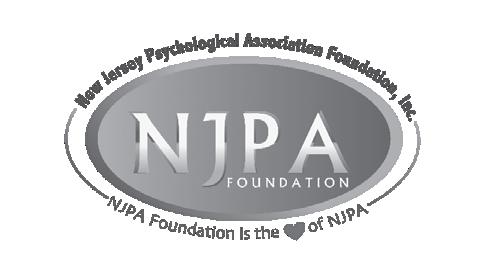
School Violence on the Victims and on Society
Impact of Separating Children from Families on the Victims and on Society
Foundation Board of Trustees may award up to $10,000 per grant recipient, per grant. The applicants will be reviewed on a rolling basis. If approved, the NJPA Foundation individual grant distribution schedule, per grant recipient.
This is awarded to a graduate student in psychology who advances the following goals: (a) promote scientific understanding of the role of diversity in psychology; (b) foster the development of sensitive models for delivery of psychological services to diverse populations. Some possible topics include issues related to cultural or ethnic issues, socioeconomic issues, gender issues, or work with underserved populations. Visit the Give page at <www.psychologynj.org> and read our quarterly Foundation Flash e-publications to learn more about all of the Foundations great work and the students’ amazing funded activities and research! Donate today!
Foundation needs your money to support this initiative. Now is the time and place to do to address these nationwide crises. We do not have to be passive, with a sense specific we can do to address these problems. Please consider a donation to the feel a sense of empowerment and take action to understand and reduce the violence and child abuse! Perhaps if each NJPA member could donate the hourly fee to the Foundation, we, as your NJPA Foundation Board of Trustees, funds to make this initiative a reality! This is a chance to act!
read more and to make a donation to the Foundation! www.psychologynj.org>
Nicole L. Eskenasi, PsyM, has successfully completed and defended her dissertation project, titled “Women Warriors: Exploring the Various Dimensions of Female Service-Members’ Role Identities.”

This qualitative study provides an in-depth exploration into the experiences of female service members who served in various branches of the United States military after 9/11/2001. Aiming to address the limited research on female service member experiences, this investigation sought to understand how lived experiences of being a female service member may contribute to the development and shifts of multiple dimensions of role identities. Six female service members, ages 26-56,
participated in semi-structured interviews that offered them the platform to openly discuss various facets of their life experiences prior to, during, and following (if applicable) their military service, and how those experiences may have influenced their identity and sense of self over time. Findings suggest female service members experience significant shifts in their identities upon entering the military and throughout their service in response to events in their environment. Through a grounded theory analysis of the data (Corbin & Strauss, 1990), a number of major thematic areas emerged that highlighted the confusion around expectations of women and their roles both in civilian society as well as in the military. There are various tensions and binds that delineate each culture’s perceptions and expectations of women. Similarly, the women received conflicting messages about femininity vs. warrior and leadership norms, and these messages subsequently impacted the women, their relationships with others, and how they viewed their sense of self. Additionally, the women who experienced role conflict or had difficulty negotiating the intersectionality of their identities tended to experience feelings of isolation, alienation, guilt, and shame. The results of this study demonstrated the need for additional exploration and study of our female service members and veterans. Understanding this study’s themes may be helpful in providing culturally competent services to this underserved population, however, much work remains to be done. ❖
A fundamental component of the New Jersey Psychological Association Foundation’s mission is to support the training of psychologists. One of the ways they meet this goal is by providing funding for studentinitiated research and projects that address psychological issues that have significant impact on community health. Through the generosity of individual contributions, we are able to offer four awards and scholarships for innovative family, school, and community projects.
An applicant must meet at least ONE of the following criteria:
1. NJPAGS student affiliate OR
2. Enrolled in a New Jersey university or college master’s or doctoral level psychology program OR
3. Psychology intern at a New Jersey facility
AWARDS
The John M. Lagos Research into Causes and/ or Treatment of Social Problems ($2000): Some possible topics include school issues, work problems, health issues, and aggression.
The NJPA Foundation Scholarship for Research on Diversity Issues ($2000): Awarded to a graduate student in psychology who advances the following goals: a) promotes scientific understanding of diversity in psychology; b) fosters the development of sensitive models for delivery of psychological services to diverse populations. Possible topics include cultural/ ethnic, socioeconomic, or gender issues or work with underserved populations.
Dr. Zellig Bach Award for the Study of the Family ($1000): Awarded for the study of behavior related to divorce, teenage pregnancy, adoption, single parents with dependent children, interpersonal abuse, substance abuse, custody, dual careers, childcare, etc.
Winifred Starbuck Scott Award ($1000): Awarded to a graduate student in school psychology for completing a distinguished project, usually during internship.
For complete requirements, evaluation criteria, and application forms, visit the Foundation at www.PsychologyNJ.org/awards-grants
APPLICATION DEADLINE: JULY 19, 2019
New Jersey Psychological Association Foundation 354 Eisenhower Parkway, Plaza I, Suite 1150 Livingston, NJ 07039 973-243-9800 • Fax 973-243-9818
Email: NJPA@PsychologyNJ.org
New Jersey Psychologist 12 NJPA Foundation Grant Highlight!
Hagovsky, PhD (President); Toby Kaufman, PhD (Secretary); Abby Rosen (Treasurer); Williams, PhD (Trustee); Richard Klein, EdD (Trustee); Ann Stainton, PhD (Trustee); Regina Budesa, PsyD (Trustee); Alyssa Austern, PsyD (Trustee)
Matt Hagovsky, PhD (President); Toby Kaufman, PhD (Secretary); Abby Rosen (Treasurer); Belvin Williams, PhD (Trustee); Richard Klein, EdD (Trustee); Ann Stainton, PhD (Trustee); Regina Budesa, PsyD (Trustee); Alyssa Austern, PsyD (Trustee); Eileen Kohutis, PhD (Trustee)
Mitch Abrams, PsyD
Mitch Abrams, PsyD
Rhonda Allen, PhD
Rhonda Allen, PhD
Amy Altenhaus, PhD
Amy Altenhaus, PhD
Mark Aronson, EdD
Mark Aronson, EdD
Alyssa Austern, PsyD
Alyssa Austern, PsyD
Jeffrey Axelbank, PsyD
Jeffrey Axelbank, PsyD
Kyle Barr, IV, PsyD
Kyle Barr, IV, PsyD
Thomas Barrett, PhD
Thomas Barrett, PhD
Louis Barretti, PhD
Louis Barretti, PhD
Theodore Batlas, PsyD
Theodore Batlas, PsyD
Amy Becker-Mattes, PhD
Amy Becker-Mattes, PhD
Leslie Becker Phelps, PhD
Leslie Becker Phelps, PhD
Roderick Bennett, PhD
Roderick Bennett, PhD
Todd Bennett, PsyD
Todd Bennett, PsyD
Rhea Bensman, PsyD
Rhea Bensman, PsyD
Helen Berman, PhD
Helen Berman, PhD
Nancy Bloom, PsyD
Nancy Bloom, PsyD
Monica Blum, PhD
Monica Blum, PhD
Alice Bontempo, PsyD
Alice Bontempo, PsyD
Randy Bressler, PsyD
Randy Bressler, PsyD
Richard Brewster, PsyD
Richard Brewster, PsyD
Natalie Brown, PhD
Natalie Brown, PhD
Charles Buchbauer, PhD
Charles Buchbauer, PhD
Diane Cabush, PsyD
Diane Cabush, PsyD
Rosemarie Ciccarello, PhD
Rosemarie Ciccarello, PhD
Jennifer Cleveland, PhD
Jennifer Cleveland, PhD
Karen Cocco, PhD
Karen Cocco, PhD
Sidney Cohen, PhD
Sidney Cohen, PhD
Deniz Colak, PhD
Deniz Colak, PhD
Louise Conley, PhD
Louise Conley, PhD
John Corbisiero, PhD
John Corbisiero, PhD
Joseph Coyne, PhD
Joseph Coyne, PhD
Stephanie Coyne,PhD
Stephanie Coyne,PhD
Daniel DaSilva, PhD
Daniel DaSilva, PhD
Richard Dauber, PhD
Richard Dauber, PhD
Bernice Davis, PsyD
Bernice Davis, PsyD
Sarah DeMarco, PsyD
Sarah DeMarco, PsyD
Phyllis DiAmbrosio, PhD
Phyllis DiAmbrosio, PhD
John Diepold, PhD
John Diepold, PhD
Rosalie DiSimone-Weiss, PhD
Rosalie DiSimone-Weiss, PhD
Charles Dodgen, PhD
Charles Dodgen, PhD
Rosalind Dorlen, PsyD
Rosalind Dorlen, PsyD
Edward Dougherty, EdD
Edward Dougherty, EdD
Frank Dyer, PhD
Frank Dyer, PhD
Nick Economou, EdD
Nick Economou, EdD
Daniel Edelman, PsyD
Daniel Edelman, PsyD
Lynn Egan, PsyD
Lynn Egan, PsyD
Susan Esquilin, PhD
Susan Esquilin, PhD
Sean Evers, PhD
Sean Evers, PhD
Roberta Fallig, PhD
Roberta Fallig, PhD
Janie Feldman, PsyD
Janie Feldman, PsyD
Stephen Feldman, PhD
Stephen Feldman, PhD
Thank you 2019 Sustaining Members!
Thank you 2019 Sustaining Members!
By advancing your level of membership to Sustaining Membership status, you have generously demonstrated your additional support of your professional association. We thank you for your commitment and dedication to your organization!
By advancing your level of membership to Sustaining Membership status, you have generously demonstrated your additional support of your professional association. We thank you for your commitment and dedication to your organization!

Dennis Finger, EdD
Dennis Finger, EdD
Christine Fingerroth, PsyD
Christine Fingerroth, PsyD
Resa Fogel, PhD
Resa Fogel, PhD
Pamela Foley, PhD
Pamela Foley, PhD
James Fosshage, PhD
James Fosshage, PhD
Kenneth Freundlich, PhD
Kenneth Freundlich, PhD
Antonia Fried, PsyD
Antonia Fried, PsyD
Thomas Frio, PhD
Thomas Frio, PhD
Abisola Gallagher, EdD
Abisola Gallagher, EdD
Joseph Ganz, PhD
Joseph Ganz, PhD
Kenneth Gates, PsyD
Kenneth Gates, PsyD
Leslie Gilbert, PhD
Leslie Gilbert, PhD
Marc Gironda, PsyD
Marc Gironda, PsyD
Ronald Gironda, PhD
Ronald Gironda, PhD
Linda Glazer, PsyD
Linda Glazer, PsyD
Elizabeth Goldberg, PhD
Elizabeth Goldberg, PhD
Gary Goldberg, PhD
Gary Goldberg, PhD
Wayne Goldman, PhD
Wayne Goldman, PhD
David Gomberg, PhD
David Gomberg, PhD
Lois Goorwitz, PhD
Lois Goorwitz, PhD
Ora Gourarie, PsyD
Ora Gourarie, PsyD
Lori Rayner Grossi, EdD
Lori Rayner Grossi, EdD
Hadassah Gurfein, PhD
Hadassah Gurfein, PhD
Mathias Hagovsky, PhD
Mathias Hagovsky, PhD
Cynthia Haines, PsyD
Cynthia Haines, PsyD
Osna Haller, PhD
Osna Haller, PhD
Raymond Hanbury, PhD
Raymond Hanbury, PhD
Jeffrey Harrison, PhD
Jeffrey Harrison, PhD
Steven Hartman, PhD
Steven Hartman, PhD
John Hennessy, PhD
John Hennessy, PhD
Susan Herman, PhD
Susan Herman, PhD
Susan Herschman, PsyD
Susan Herschman, PsyD
Lauraine Hollyer, PhD
Lauraine Hollyer, PhD
Ann Nikolai Houston, PhD
Ann Nikolai Houston, PhD
Lisa Jacobs, PhD
Lisa Jacobs, PhD
Alison Johnson, PsyD
Alison Johnson, PsyD
Kyung Jung, PhD
Kyung Jung, PhD
Nancy Just, PhD
Nancy Just, PhD
Jeffrey Kahn, PhD
Jeffrey Kahn, PhD
Paula Kaplan-Reiss, PhD
Paula Kaplan-Reiss, PhD
Robert Karlin, PhD
Robert Karlin, PhD
Charles Katz, PhD
Charles Katz, PhD
Toby Kaufman, PhD
Toby Kaufman, PhD
Thomas Kavanagh, PsyD
Thomas Kavanagh, PsyD
Eileen Kennedy-Moore, PhD
Eileen Kennedy-Moore, PhD
Richard Kessler, PhD
Richard Kessler, PhD
Lisa Kestler, PhD
Lisa Kestler, PhD
Stanley Keyles, PsyD
Stanley Keyles, PsyD
Joel Kleinman, PhD
Joel Kleinman, PhD
Steven Korner, PhD
Steven Korner, PhD
Deirdre Kramer, PhD
Deirdre Kramer, PhD
David Krauss, PhD
David Krauss, PhD
Phyllis Lakin, PhD
Phyllis Lakin, PhD
Robin Lang, PsyD
Robin Lang, PsyD
Eli Leiter, PhD
Eli Leiter, PhD
Roman Lemega, PhD
Roman Lemega, PhD
Ilana Lev-El, PsyD
Ilana Lev-El, PsyD
Robert Levine, PhD
Robert Levine, PhD
Monica Lintott, PhD
Monica Lintott, PhD
Neal Litinger, PhD
Neal Litinger, PhD
John LoConte, PhD
John LoConte, PhD
Rebecca Loomis, PhD
Rebecca Loomis, PhD
Mark Lowenthal, PsyD
Mark Lowenthal, PsyD
Konstantin Lukin, PhD
Konstantin Lukin, PhD
Marc Lyall, PsyD
Marc Lyall, PsyD
Marilyn Lyga, PhD
Marilyn Lyga, PhD
David MacIsaac, PhD
David MacIsaac, PhD
William MacLaney, PsyD
William MacLaney, PsyD
Daniel Mahoney, EdD
Daniel Mahoney, EdD
Stanley Mandel, EdD
Stanley Mandel, EdD
Melissa Rivera Marano, PsyD
Melissa Rivera Marano, PsyD
Bonnie Markham, PhD, PsyD
Bonnie Markham, PhD, PsyD
Nicole Martell, PsyD
Nicole Martell, PsyD
Neil Massoth, PhD
Neil Massoth, PhD
Shirley Matthews, PhD
Shirley Matthews, PhD
John McInerney, PhD
John McInerney, PhD
David Mednick, PsyD
David Mednick, PsyD
Wilda Mesias, PhD
Wilda Mesias, PhD
Marshall Mintz, PsyD
Marshall Mintz, PsyD
Barry Mitchell, PsyD
Barry Mitchell, PsyD
Noreen Mohle, PhD
Noreen Mohle, PhD
Ruth Mollod, PhD
Ruth Mollod, PhD
Sharon Ryan Montgomery, PsyD
Sharon Ryan Montgomery, PsyD
Gregory Moore, PsyD
Gregory Moore, PsyD
Caridad Moreno, PhD
Caridad Moreno, PhD
Sandra Morrow, PhD
Sandra Morrow, PhD
Daniel Moss, PhD
Daniel Moss, PhD
Richard Mucowski, PhD, EdD
Richard Mucowski, PhD, EdD
Morgan Murray, PhD
Morgan Murray, PhD
Susan Neigher, PhD
Susan Neigher, PhD
Jeffrey Newenhouse, PsyD
Jeffrey Newenhouse, PsyD
Hulon Newsome, PsyD
Hulon Newsome, PsyD
Daniel Noll, PhD
Daniel Noll, PhD
Cheryl Notari, PhD
Cheryl Notari, PhD
Denise Novaky, PhD
Denise Novaky, PhD
Carly Orenstein, PsyD
Carly Orenstein, PsyD
David Panzer, PsyD
David Panzer, PsyD
Craig Pearl, PsyD
Craig Pearl, PsyD
Francesca Peckman, PsyD
Francesca Peckman, PsyD
Mark Pesner, PhD
Mark Pesner, PhD
Michele Rabinowitz, PsyD
Michele Rabinowitz, PsyD
Nicole J. Rafanello, PhD
Nicole J. Rafanello, PhD
Jonathan Rapaport, PhD
Jonathan Rapaport, PhD
Richard Rapkin, PsyD
Richard Rapkin, PsyD
Howard Rappaport, PsyD
Howard Rappaport, PsyD
Gina Rayfield, PhD
Gina Rayfield, PhD
Ann Reese, PhD, PsyD
Ann Reese, PhD, PsyD
Ellen Reicher, PhD
Ellen Reicher, PhD
AnnaMarie Resnikoff, PhD
AnnaMarie Resnikoff, PhD
Laura Richardson, PhD
Laura Richardson, PhD
Marion Rollings, PhD
Marion Rollings, PhD
Amelia Romanowsky, PsyD
Amelia Romanowsky, PsyD
Barbara Rosenberg, PhD
Barbara Rosenberg, PhD
Francine Rosenberg, PsyD
Francine Rosenberg, PsyD
Elissa Rozov, PhD
Elissa Rozov, PhD
Anne Rybowski, PhD
Anne Rybowski, PhD
Nicole Safonte-Strumolo, PhD
Nicole Safonte-Strumolo, PhD
Carole Salvador, PsyD
Carole Salvador, PsyD
Peter Schild, EdD
Peter Schild, EdD
Jay Schmulowitz, PhD
Jay Schmulowitz, PhD
Natalie Schuberth, PsyD
Natalie Schuberth, PsyD
Ellen Schwartz, PhD
Ellen Schwartz, PhD
Margot Schwartz, PsyD
Margot Schwartz, PsyD
Nancie Senet, PhD
Nancie Senet, PhD
Eileen Senior, PsyD
Eileen Senior, PsyD
Laura Shack-Finger, EdD
Laura Shack-Finger, EdD
Arline Shaffer, PhD
Arline Shaffer, PhD
William Shinefield, PsyD
William Shinefield, PsyD
Nancy Sidhu, PhD
Nancy Sidhu, PhD
Ronald Silikovitz, PhD
Ronald Silikovitz, PhD
Jane Simon, PhD
Jane Simon, PhD
Jeffrey Singer, PhD
Jeffrey Singer, PhD
Tamara Sofair-Fisch, PhD
Tamara Sofair-Fisch, PhD
Jeffrey Spector, PsyD
Jeffrey Spector, PsyD
Mary Ellen Stanisci, PhD
Mary Ellen Stanisci, PhD
Jakob Steinberg, PhD
Jakob Steinberg, PhD
Deana Stevens, PsyD
Deana Stevens, PsyD
Jeffrey Stone, PhD
Jeffrey Stone, PhD
Vincent Stranges, PhD
Vincent Stranges, PhD
Luciene Takagi, PsyD
Luciene Takagi, PsyD
Anthony Tasso, PhD
Anthony Tasso, PhD
H. Augustus Taylor, PhD
H. Augustus Taylor, PhD
Tamsen Thorpe, PhD
Tamsen Thorpe, PhD
Barbara Tocco, EdD
Barbara Tocco, EdD
Jonathan Wall, PsyD
Jonathan Wall, PsyD
Virginia Walters, PsyD
Virginia Walters, PsyD
Arnold Washton, PhD
Arnold Washton, PhD
Beth Watchman, PhD
Beth Watchman, PhD
Virginia Waters, PhD
Virginia Waters, PhD
Daniel Watter, EdD
Daniel Watter, EdD
Allen Weg, EdD
Allen Weg, EdD
Aaron Welt, PhD
Aaron Welt, PhD
Norbert Wetzel, ThD
Norbert Wetzel, ThD
James Wulach, PhD, JD
James Wulach, PhD, JD
Joshua Zavin, PhD
Joshua Zavin, PhD
Stanley Zebrowski, PhD
Stanley Zebrowski, PhD
Michael Zito, PhD
Michael Zito, PhD
Spring 2019 13
CALL FOR NOMINATIONS
CALL FOR NOMINATIONS
Nominations are currently being solicited for positions on the 2020 NJPA Executive Board.
Nominations are currently being solicited for positions on the 2020 NJPA Executive Board.
All candidates for elected office in the New Jersey Psychological As sociation must meet the following criteria:
All candidates for elected office in the New Jersey Psychological As sociation must meet the following criteria:
1. NJPA member, in good standing,
1. NJPA member, in good standing,
2. Evidence of volunteer involvement in NJPA and/or a leadership role in an NJPA Affiliate Organization for at least one year, and
2. Evidence of volunteer involvement in NJPA and/or a leadership role in an NJPA Affiliate Organization for at least one year, and
3. No current legal or ethical violations as determined by the BoPE, court, or other governing body.
3. No current legal or ethical violations as determined by the BoPE, court, or other governing body.
Volunteer yourself or nominate a colleague to serve . Submit via the online form a prepared statement of nominee’s qualifications along with this form, a recent CV, and return to the Central Office by June 15, 2019. The form can be found in the Members Only section of the website (login required).
Volunteer yourself or nominate a colleague to serve . Submit via the online form a prepared statement of nominee’s qualifications along with this form, a recent CV, and return to the Central Office by June 15, 2019 The form can be found in the Members Only section of the website (login required).
Members of the executive board have the responsibility to govern the association and to set policy and priorities. In addition to these major roles, each board member has specific responsibilities. Important Note: Material for executive board meetings is sent electronically. Board members must be able to access and review these documents prior to Board Meetings
Members of the executive board have the responsibility to govern the association and to set policy and priorities. In addition to these major roles, each board member has specific responsibilities. Important Note: Material for executive board meetings is sent electronically. Board members must be able to access and review these documents prior to Board Meetings
BOARD OPENINGS:
BOARD OPENINGS:
As stated in the NJPA bylaws, al l NJPA elections shall follow the policies and procedures set forth by the Nominations and Leadership Development Committee that were approved by the executive board.
As stated in the NJPA bylaws, al l NJPA elections shall follow the policies and procedures set forth by the Nominations and Leadership Development Committee that were approved by the executive board.
PRESIDENT-ELECT: Candidates for President-Elect must have served on the executive board or in a leadership position in an affiliate organization, or chaired a committee, special interest group (SIG), task force, or resource group, or had an active role as a committee, SIG, task force, or resource group member of NJPA within the last three years.
PRESIDENT-ELECT: Candidates for President-Elect must have served on the executive board or in a leadership position in an affiliate organization, or chaired a committee, special interest group (SIG), task force, or resource group, or had an active role as a committee, SIG, task force, or resource group member of NJPA within the last three years.
Term of office: January 2020 to December 2020 as President-Elect; January 2021 to December 2021 as President; January 2022 to December 2022 as Past-President.
Term of office: January 2020 to December 2020 as President-Elect; January 2021 to December 2021 as President; January 2022 to December 2022 as Past-President.
MEMBER-AT-LARGE (General Membership) - 1 seat open: Candidates must be a member in good standing in NJPA and have had an active role in an NJPA committee, or other NJPA group including NJPAGS, task force, special interest group, resource group, or affiliate within the last year.
MEMBER-AT-LARGE (General Membership) - 1 seat open: Candidates must be a member in good standing in NJPA and have had an active role in an NJPA committee, or other NJPA group including NJPAGS, task force, special interest group, resource group, or affiliate within the last year.
Term of office: January 2020 to December 2022
Term of office: January 2020 to December 2022
All nominations must be submitted electronically through the form found on in the Members O nly section of our website www.psychologynj.org The board job descriptions can be found on the website with the nominations form.
All nominations must be submitted electronically through the form found on in the Members O nly section of our website www.psychologynj.org The board job descriptions can be found on the website with the nominations form.

New Jersey Psychologist 14
Return to Harmony: Conflict Management for Couples
Anthony F. Tasso, PhD Fairleigh Dickinson University Chair, Department of Psychology & Counseling
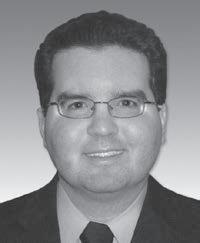
Intimate partner distress accounts for a significant amount of personal anguish and is a major reason why people seek psychological services (whether formal couples’ therapy or individual treatment). As such, relationship disharmony is responsible for the lion’s share of content in our consulting rooms. From matters such as miscommunication, sexual dysfunction, and problematic balancing of work-family life, to the more disconcerting issues surrounding psychopathology (individual and/or marital), substance abuse, infidelity, and child or partner abuse, relational distress is omnipresent.
Despite the pervasiveness of couples’ woes, there is a dearth of theoretically sound, easily applicable aids for those in the throes of relational dissonance. Although the internet is abound with selfhelp resources extolling their ability to quell intimate partner disharmony while facilitating relational satisfaction, individuals and couples are all-too-frequently left fraught with helplessness (and possibly hopelessness) following another perceived failure in their attempts to remedy their flagging relationships. In other words, distressed couples (not to mention those who treat them) could use some help.
Return to Harmony: Conflict Management for Couples (Archway Publishing) is a welcomed lifeline for these suffering couples. Psychologist Les Barbanell’s simple yet comprehensive book assists couples in conflict as well as individuals grappling with a problematic relationship. Although designed to be a self-help book, its nuanced analysis of the depth and breadth of intimate partner struggles also makes Return to Harmony a handy resource for today’s mental health clinician.
Return to Harmony is centered on what the author describes as the ‘love cycle,’ which is his aggregation of a number of long-standing theories to understand intimate partnerships. The love cycle begins
Barbanell, L.
Bloomington, IN: Archway Publishing
with the romantic phase, in which is the early excitement of lust and love produces a near myopic accentuation of the good in the partner and conjures boundless relationship possibilities. This gives way to the discovery phase, characterized by a growing awareness of shortcomings in the other and the partnership as the rose-colored glasses fade. It is during this phase that destructive proclivities often develop such as blaming, withholding, and unproductive communication. The recovery phase, the foundation of the text, is the restorative stage in which the couple ideally moves back toward the more realistic latter end of the romantic phase -- developing a healthily ambivalent appreciation of the relationship. Here, they are able to understand and accept the full range of the significant other’s perceived desirable and undesirable qualities, allowing for an authentic connection with each other. This paves the way for productive communication.
Early in the text the author illustrates common relational experiences that perpetuate disharmony. Noteworthy is how relatively banal experiences (e.g., avoidance of conflict, unsolicited advice giving) can result in relationship problems. Barbanell contends that blaming and competing are two of the more relationally toxic penchants, with the resulting win—loss mentality frequently causing shame, resentment, and isolation. The book further expounds on the oft-subtle issues that stimulate and intensify relational problems, such as harboring fantasies about returning to the infatuation of the early romantic phase, withholding unpleasant information in order to not “burden” one’s partner, and hoping that the passage of time will ameliorate marital woes. Barbanell also reports on the deleterious effects of couples who, in the midst of a crumbling relationship, obfuscate (to themselves and others) the depth of their distress by acting as-if the relationship is well and that existing
problems are insignificant, thus rendering proactive change even more challenging. Here, Return to Harmony nicely highlights the ideals and behaviors that stimulate and intensify relational problems.
Throughout the book Barbanell underlies the potency of the unconscious. The author taps into Clifford Sager’s relational concept of the ‘unconscious contract,’ describing how each partner colludes with the pathological expectations about the other and the relationship. The book then segues to compromised communication, which flies under the conscious radar of couples, yet is arguably one of the most damaging phenomena in relationships. Barbanell illustrates the ways in which sarcasm, withholding (often manifesting as the “silent treatment”), scripted dialogue, and defensive intellectual language can stymie authentic communication. Return to Harmony further delves into communication problems by rightly pointing out the perils of technology, including a reliance on mechanical means of communication (precluding productive discussions) to its actual physical intrusion into the marital bed (precluding communication and intimacy).
Return to Harmony also addresses the profound impact of having a child. Barbanell touches on the more obvious baby-related relational stressors (e.g., parental exhaustion, financial worries, intrusive in-laws), the possibility of the mother’s postpartum depression, and the under acknowledged paternal postpartum reactions, with its frequent genesis the new father’s threat of the maternal preoccupation with the newborn. The author provides readily accessible means for couples to better understand how these experiences affect the dyad and ways they can be examined in a non-defensive manner.
Next, Return to Harmony decidedly moves the discussion to intervention,
Spring 2019 15 Book
Review:
(2019).
which he aptly calls the recovery phase After a collective acknowledgement that there are significant relationship problems, the couple is now positioned to commence non-hostile confrontation. The author provides multiple case examples demonstrating how one can supportively approach his or her partner to address perceived grievances and work through pressing issues. The text shows how undesirable emotions such as anxiety, anger, guilt, and even jealously and shame can, despite profound discomfort, foster insight and self-awareness into one’s own experience of self and other. This consists of developing a robust awareness of how historical experiences impinge on the current relationship, and how healthy communication enables partners to engage in the systematic restoration of realitybased mature love and respect. Barbanell emphasizes that mindfulness of relational expectations, openness to shifting marital roles, and avoidance of complacency are the springboards for relational enhancement. Return to Harmony underscores the need to work towards a shared (as opposed to an individualized) view of familial needs and goals, and emphasizes the willingness to be vulnerable as integral to the process.
The book introduces the concept of ‘couple intelligence,’ a coalescence of cog-
nitive, social, and emotional intelligences. Barbanell explains that self-awareness, empathy, self-disclosure, distribution of power, and productive boundaries are the building blocks of couple intelligence. He argues that the ability to attend to the emotional experiences of self and other is a harbinger of the relationship’s health, while failures to appreciate the complexity of the relationship ails the partnership. Return to Harmony elucidates how to facilitate harmony – to think as a unit without engulfing the other; to problem solve as a team without disavowing one’s individuality; to be able to disagree without being disagreeable.
Much of Return to Harmony arms couples with tidbits of information on how to address their relationship problems. With that, the book realistically helps couples understand that formal therapy may be warranted. The author spells out how the suffering couple can develop tangible therapeutic outcomes, temper expectations, and cultivate their conjoint thinking and planning. Barbanell provides couples with a useful list to assess whether therapy is on a productive path. The text contrasts examples of unproductive counseling experiences (e.g., one partner or the therapist doing the bulk of the work, failure to adhere to boundaries, continued/growing concern for intimate partner violence,
MEMBER NEWS
unwillingness to modify or adapt) with productive counseling experiences (e.g., accountability, therapeutic collaboration, adopting a couples’ mentality, authentic ability to be vulnerable).
A simple yet thorough read, Return to Harmony can serve as a salvation to couples or individuals in relational distress. Barbanell’s non-jargon prose makes his work easily accessible to the layperson, yet it is solidly anchored in well-used theories, creating a tool with great helping potential. It is certainly a worthy purchase for distressed couples. However, Return to Harmony’s utility is not limited to the general public. While likely outside the purview of serious psychopathology, family violence, or substance abuse, the book’s guidance and techniques will surely support the clinician working with couples or individuals dealing with relational unrest. As such, Return to Harmony is a worthy purchase for disharmonious couples and those who treat them. ❖
About the Author:
Anthony F. Tasso, Ph.D., ABPP is Professor of Psychology and Chair of the Department of Psychology and Counseling at Fairleigh Dickinson University in Madison, NJ. He also maintains a private practice in Whippany (Hanover Township), Morris County, NJ.
Frank J. Sileo, PhD, a Ridgewood psychologist, published his ninth children’s book that was released in March 2019. The book is called Bee Calm: The Buzz on Yoga. It is published by Magination Press, the children’s imprint of the American Psychological Association. This book is a follow up to his award-winning book Bee Still: An Invitation to Meditation. In September 2019 he will have his tenth children’s book published by Magination Press entitled Snitchy Witch. He also recently signed a book contract for another children’s book in the Bee series on a particular aspect of mindfulness.
Madelyn Milchman, PhD published the following articles:
Milchman, M.S. (2018). Misogynistic cultural argument in parental alienation versus child sexual abuse cases.
Journal of Child Custody.14:4, *
Milchman, M.S. (2018). Misogyny in NYS custody decisions with parental alienation versus child sexual abuse allegations.
Journal of Child Custody
Milchman, M.S. (2017). Implicit cultural arguments affect the science of shared parenting. Journal of Child Custody, 14:4. 234-259.
Milchman, M.S. (2018, in press). Implicit cultural arguments affect the science of shared parenting: Commentary.
Journal of Child Custody
Milchman, M.S. (2019, in press). How Far Has Parental Alienation Research Progressed Towards Achieving Scientific Validity?
Journal of Child Custody.
Commentary: Implicit cultural arguments affect the science of shared parenting, in Journal of Child Custody, Volume 15 Issue 3, is now available for you to access via tandfonline.com.
For those who are interested, a limited number of copies are available on-line at: <https://www.tandfonline.com/eprint/NmKzDAHWzbdCBkf3sYVs/full?target=10.1080/15379418.2018.1543035>
New Jersey Psychologist 16
Rhonda Allen, PhD Council of Representatives (NJ) (2019-22)

Iam proud to have the opportunity to represent New Jersey as a member of the APA Council of Representatives. This was an enlightening experience for me since I must admit that, even though I have been a licensed psychologist for almost 30 years and member of APA even longer, I was not familiar with the inner workings of APA. New members of council attended a full day orientation on February 14th that was extremely helpful in explaining what would be expected of us as council members. It also provided me with a valuable opportunity to meet some of my fellow council members from all over the United States and Canada.
The following is a summary of the major decisions and votes at this meeting. Much of what is reported below is excerpted from a meeting summary provided to council members from APA.
One of the first votes was to approve a new Strategic Plan. This plan was overwhelmingly approved by more than 96 percent of council. The plan is aimed at fostering “a strong, diverse and unified psychology that enhances knowledge and improves the human condition,” according to its vision statement.
Specifically, the goals of the plan are to:
• Utilize psychology to make a positive impact on critical societal issues.
• Elevate the public’s understanding of, regard for, and use of p sychology.
• Prepare the discipline and profession of psychology for the future.
• Strengthen APA’s standing as an authoritative voice for psychology.
Guiding these efforts are principles that call for APA to ensure its efforts are grounded in the best available psychological science; champion diversity and inclusion; respect and promote human rights; and embrace a global perspective, among
other values. To read the plan, go to <www.apa.org/about/apa/strategic-plan>.
OTHER COUNCIL VOTES
In further action, the APA council:
• Voted to receive a report regarding master’s programs in health-service psychology. The Report of the Board of Educational Affairs Task Force to Develop A Blueprint for APA Accreditation of Master’s Programs in Health Service Psychology discusses possible pathways APA could use to establish accreditation of master’s programs in psychology. In addition, the report identifies the necessary expertise needed to constitute an accreditation decision-making body. The report will inform the development of standards for accreditation of master’s programs in health service psychology. To read the report, go to <www.apa. org/ed/governance/bea/mastersaccreditation-blueprint>.
• Adopted the Resolution on Physical Discipline of Children by Parents that recommends caregivers use alternative forms of discipline, such as modeling behavior, respectful communication, and collaborative conflict resolution, rather than physical punishment. The resolution points out that, according to the research, physical discipline is not effective in achieving parents’ goals of decreasing aggressive and defiant behavior in children or of promoting positive child behaviors. The resolution commits APA to raising public awareness and increasing education about the impact of physical discipline on children and the effectiveness of other methods of discipline.
It also calls on APA to promote culturally responsive training and continuing education on alternative discipline strategies. (A press release was issued on Feb. 18.)
• Adopted the Resolution on Physical Discipline of Children by Parents that recommends that caregivers use alternative forms of discipline, such as modeling behavior, respectful communication, and collaborative conflict resolution, rather than physical punishment. The resolution points out that, according to the research, physical discipline is not effective in achieving parents’ goals of decreasing aggressive and defiant behavior in children or of promoting positive child behaviors.
• Adopted a clinical practice guideline for depression. The Clinical Practice Guideline for the Treatment of Depression Across Three Age Cohorts provides recommendations for the treatment of depressive disorders based primarily on systematic reviews of the evidence. The guideline addresses three developmental cohorts: children and adolescents; general adults; and older adults (ages 60 and over). It is intended for psychologists, other health and mental health professionals, consumers, families of consumers, students/training programs, policymakers, and the public. This guideline is aspirational and is not intended to create a requirement for practice. The guideline is expected to be available on APA’s website by summer.
• Approved a resolution to improve child and adolescent care. The Resolution on Child and Adolescent Mental and Behavioral
Winter 2019 17 APA Council of Representatives Report
APA COUNCIL REPORT
The Council of Representatives of the American Psychological Association met in Washington, DC February 15 – 17 2019.
Health calls on APA to “take a significant leadership role to support and advocate that it is every child’s right to have access to culturally competent, developmentally appropriate, family-oriented, evidencebased, high-quality mental health services that are in accessible settings.” It replaces an earlier, outdated resolution.
• Approved a rules amendment to clarify division public policy statements. The amendment clarifies existing policy stating that division position or policy statements on matters of public policy must be consistent with APA bylaws, rules, and any existing APA policy. If APA policy does not exist, consistent with current practice, divisions may issue statements with appropriate disclaimers that the position they are taking is not APA policy but represents only the views of the division.
• Approved an update of APA’s policies and curriculum related to psychopharmacology.
Major changes to the curriculum include adding the possibility of providing significantly more psychopharmacology training at the doctoral level, rather than the previous requirement that most of the training occur at the post-licensure/postdoctoral level.
PRESIDENTIAL CITATIONS
APA President Rosie Phillips Davis, PhD, ABPP, awarded several Presidential Citations for outstanding contributions to psychology. The citations went to:
The APA Leadership Institute for Women in Psychology, recognized for its commitment to supporting, empowering and preparing women psychologists for leadership roles and strengthen the field of psychology.
Former APF Chief Elisabeth Straus, who served as executive director/executive vice president of the American Psychological Foundation (APF) for 27 years until her retirement in 2018. During her tenure, Straus transformed APF from a small organization with less than $1 million in assets to a Foundation that now provides $1 million every year in grants, scholarships, and awards that invest in students and early career psychologists.
Bethany A. Teachman, PhD, honored for her leadership in advancing evidencebased practice in psychology and in applying technology to mental health research and practice.
I am looking forward to representing New Jersey again at the next Council of Representatives meeting that will be held during the APA convention in Chicago this August. I will again provide a summary of the meeting upon my return.
In closing, I owe a heartfelt thank you to Dr. Joseph Coyne who generously
Earn 40 APA CEs
The Gold Standard and fully accredited EMDR therapy Basic Stay right here in beautiful Iselin, NJ (Fri, Sat, Sun)
Part 1 2019 November 22, 23, 24
Part 2 2020 February 28, 29, March 1
For brochure and further information contact: NJPA member Sheila Bender 973-765-0749; drssbender@gmail.com OR The EMDR Institute in Watsonville, CA www.emdr.com 1-831-761-1040
If you are already basic EMDR therapy trained Earn 13 APA CEs
EMDR Through the Dialectical Lens: Theory & Practice

Iselin NJ, July 20-21
For brochure or info: Sheila Bender 973-765-0749; drssbender@gmail.com
offered to be my mentor and spent several hours before the February meeting helping me navigate my way enormous through the lengthy meeting agenda. He additionally literally stayed by my side the entire 3 days, explaining the protocol of the meeting, providing the backstory of many of the motions, in addition to introducing me to many of our esteemed colleges in APA leadership. ❖
POETRY
CORNER Projective Identification
If I let out what is inside of me
Could you contain it and not cease to be
Would that allow me to now feel free
Of all that consists of my vulnerability
And also now would we be connected
Could I now no longer feel so neglected
It seems so much more than what could be expected
To feel understood, to feel so protected
What would it be, if that could be
Could it still be you, could it still be me
Would that feel like a true reality
Would all the angst and terror subside
Would we no longer have to hide
Rather stand now, side by side
Could we project and identify
Not reject or crucify Hold and contain Sanity maintain
If we could, would we survive?
If we could, would we thrive?
If we would, we could survive!
If we would, we could thrive!
©Marshall S. Harth, 5 May 2015 1240 @ Long Branch
Reaction to: Catherall, D. (1992) “Working with Projective Identification in Couples”, Family Process, 31,4,355-367. Couples in Impasse class.
New Jersey Psychologist 18
EMDR Therapy through the EMDR Institute
Moving Beyond the Student Identity
Navigating the culture of academia can be emotionally exhausting. As we strive to meet the rigorous demands of graduate-level work, we may feel more like producers than professionals. In the process of living up to standards set by faculty, the profession, and our own unrealistic expectations, we can easily lose ourselves in the work. The benchmarks for student achievement are nuanced and there is always room for growth, leading us to question our own ability to meet desired goals. Guilt sets in when we “procrastinate” to catch our breath, sowing seeds of doubt within ourselves and about our commitment as students and trainees.
To combat these stressors, I draw support from family, especially my wife who inspires me with her strength and resiliency, reminding me every day that I am more than my work. I am more than a student, a therapist, or a “professor” and when I graduate, I will be more than a doctor. A mentor who I deeply admire once said to me that “we grow in the context of relationships.” As I reflect on the six years I spent as a graduate student, I realize that it was not the course objectives or training models that taught me what kind of psychologist I wanted to be, but the relationships I built with friends, family, and colleagues throughout my life. They remind me where I came from and who I really am beyond the “doctoral student”. NJPAGS is a student organization that serves a similar function. We are well positioned to continue promoting support among students across programs in ways that are unique from the mentorship offered by faculty and supervisors.
Amid navigating issues of imposter syndrome, financial stress, work-life balance, and other adversities, we may feel disconnected from ourselves and others. Some of us get so lost in the work that we forget the meaning behind why we
chose to pursue a doctorate to begin with. Marx’s (1844) concept of alienation illustrates the lived experience of graduate students who barely hold their heads above water. He argues that workers are reduced to commodities or instruments of production and thus, are unable to gain psychological gratification from their labor or connect with others regarding the larger purpose behind their collective work. Although this only partially applies given the inherent class privilege of being in higher education, it nonetheless resonates.
Graduate study involves collaborating with and working alongside others, yet a significant portion of our work is carried out in silos. Research and other projects are often unique to our own professional goals and are therefore, solitary endeavors. When taking coursework, clinical training, and research into account, most PhD students work an average of 60 hours a week, making it increasingly difficult to find time for friends and family. Based on my experiences, along with some of my colleagues’, students from low-income, working-class backgrounds often take counseling, teaching, or entry-level jobs to supplement any stipends they may or may not receive, making work-life balance all the more allusive.
Given this rather grim reality, it is no wonder that scholars point to a “mental health crisis” in graduate education (Evans, Bira, Gastelum, Weiss, & Vanderford, 2018). Compared to the general population, graduate students are more than six times more likely to experience depression or anxiety. These rates are higher among transgender, gender nonconforming students, and women when compared to their cisgender male counterparts (Evans et al., 2018). Among students of color, racial microaggressions and other negative race-related experiences in academia pose additional risk factors that compromise mental health and well-being (Clark, Chelsi, Sterett, Mercer, ZeiglerHill, & Dufrene. 2012.; El-Ghoroury, Galper, Sawaqdeh, & Bufka, 2012; Torres, Driscoll, & Burrow, 2010).

The high prevalence of clinical depression and anxiety within the broader graduate student population reflects disproportionate rates among clinical and counseling
PhD students (Rummell, 2015). These hardships lead to burn out and can trickle down to clients, as stress can make it increasingly difficult for trainees to provide adequate care to their clients (Pope & Vasquez, 2007). Many trainees are treating patients for the first time under specific adverse conditions that seasoned professionals who have the clinical knowledge and skills do not have to contend with. Taken together with the lack of adequate and even psychologically harmful on-site supervision (Ellis, Berger, Hanus, Ayala, Swords, & Siembor, 2014), the ethical implications of this can have major ripple effects not only for student mental health, but for the profession.
Support can be hard to come by and the lack of mentoring from faculty and advisors (Evans, et al. 2018) might make it increasingly difficult for graduate students to get their needs met. Thus, creating opportunities and spaces for students to feel a sense of belonging and support are crucial. Professional organizations like NJPA and NJPAGS serve a vital role for supporting students in this context. Moreover, social support from faculty and supervisors are not always frequently endorsed as common coping strategies employed by graduate students (ElGhoroury et al., 2012), suggesting that we as students should be continuing to build those support networks.
It is only when we engage with other professionals and students within and across programs, and connect with the broader community around issues of common interest that we can feel revitalized in our work. Thus, we should not underestimate the integral role that group cohesion and social support play in our personal and professional lives. This is particularly relevant, since social support from friends, family, and classmates are the most common coping strategies among psychology graduate students (El-Ghoroury et al., 2012).
NJPAGS Socials and other opportunities to connect with students strengthen informal supports which keep us resilient and allow us to thrive in our programs. Most of the research on graduate student resiliency asks the question, “What can faculty do to provide support?”. I would argue however,
Spring 2019 19
“We’re More Than What We Produce”:
Christopher Thompson, EdS, LAC, Chair NJPAGS
that it is up to us as students to organize and build an inclusive culture of solidarity among students. The sense of universality that comes from shared experience can be affirming for those dealing with imposter syndrome or at the very least, questioning their role in graduate school. These student-led, bottom-up initiatives remind us why we chose to become psychologists, while helping us touch base with who we are as individuals beyond the narrow confines of the “student” identity.
Among graduate students, work-life balance is significantly correlated with better mental health outcomes (Evans, et al. 2018), suggesting the importance of putting the work aside without feeling guilty about it. It can be difficult to develop a professional identity if we spend most of our waking hours neglecting the driving force that sparked our passion to make a difference in the first place. In our training, we are taught that self-care should be a central part of what we practice, a somewhat mixed message given the culture we live in. However, in the same way that we prioritize meetings with faculty and meeting deadlines, clearing our schedules to cultivate and build relationships becomes just as important.
Self-care means acknowledging that we are more than what we produce and that we deserve prioritizing. ❖
References
Clark, Chelsi R., Sterett H. Mercer, Virgil Zeigler-Hill, and Brad A Dufrene. 2012. “Barriers to the Success of Ethnic Minority Students in School Psychology Graduate Programs.” The University of Southern Mississippi School Psychology Review 41(2):176–92.
El-Ghoroury, N. H., Galper, D. I., Sawaqdeh, A., & Bufka, L. F. (2012). Stress, coping, and barriers to wellness among psychology graduate students. Training and Education in Professional Psychology, 6(2), 122.
Ellis, M. V., Berger, L., Hanus, A. E., Ayala, E. E., Swords, B. A., & Siembor, M. (2014). Inadequate and harmful clinical supervision: Testing a revised framework and assessing occurrence. The Counseling Psychologist, 42(4), 434-472.
Evans, T. M., Bira, L., Gastelum, J. B., et al. (2018). Evidence for a mental health crisis in graduate education. Nature Biotechnology, 36, 282-284.
Marx, K. (1844). Economic and philosophical manuscripts. Early writings, 333.
Pope, K., & Vasquez, M. J. T. (2007). Responding to suicidal risk. Ethics in psychotherapy and counseling: A practical guide, 3.
Rummell, C. M. (2015). An exploratory study of psychology graduate student workload, health, and program satisfaction. Professional Psychology: Research and Practice, 46(6), 391.
Torres, L., Driscoll, M. W., & Burrow, A. L. (2010). Racial microaggressions and psychological functioning among highly achieving African-Americans: A mixed-methods approach. Journal of Social and Clinical Psychology, 29(10), 1074-1099.

PSYCHOLOGIST OF THE YEAR
Recognize and nominate a fellow member who has made an outstanding contribution to the profession of psychology through demonstrated excellence in practice, research, or teaching. Recipients will be selected by the Nominations Committee and Psychologist of the Year Subcommittee based upon how well they meet the criteria of the award.

CITIZEN OF THE YEAR
Awarded to a non-psychologist who has made significant contributions to the ideals of mental health or social welfare. Recipients will be selected by the NJPA Executive Board based upon how well they meet the criteria of the award.

STANLEY MOLDAWSKY MENTOR AWARD
Recognizes a member who exhibits exceptional leadership over a sustained period of time, in the form of enduring and exemplary contributions to mentoring new psychologists and/ or graduate students.
JANE SELZER MEMBERSHIP RECOGNITION AWARD
Long-time employee Ms. Jane Selzer’s was passionately involved with NJPA membership. In an effort to publicly acknowledge and recognize those members who contribute so much to NJPA in so many diverse ways, the NJPA Membership Committee established this award to recognize members who add value to NJPA every day.
Please take the time to think of someone you admire and/or appreciate that you wish to nominate.
The deadline for submissions is June 15, 2019. Read more about the awards and find an nomination form at www.psychologynj.org/login
New Jersey Psychologist 20 NJ’s Premier Mental Health Billing Specialist for Over a Decade Work Completed in our NJ Office Web: mentalhealthbillers.com 732-251-4800 or 800-589-4613 mona@assocbillingctr.com Reg. NJ Dept of Banking & Insurance
Why Psychologists Choose The Trust...
1. We Are You
Our coverage is designed by psychologists and insurance experts with a focus on psychology.
2. The Total Package
We offer the convenience of securing all of your financial protection needs in one location. Our programs cover your entire life - not just your career.
3. More Options, Better Value
Choose from claims-made or occurrence coverage. A free, unrestricted ‘tail’ is offered with every claims-made policy upon retirement, death or disability.

4. Our Reputation is Solid
More psychologists purchase their coverage through The Trust than from any other provider. Our program’s insurance carrier, Chubb, holds the strongest rating from A.M. Best: A++(Superior).
5. Free Expert Risk Management Advice
We’re the only provider that offers free confidential ethical and risk management consultations through our Advocate 800 Program.
6. Exceptional Continuing Education
All of our clients receives a free TrustPARMA** membership that includes access to informative content, sample documents, discounts to workshops, on-demand webinars, CE exams, and much more!
* Insurance provided by ACE American Insurance Company, Philadelphia, PA and its U.S.-based Chubb underwriting company affiliates. Program administered by Trust Risk Management Services, Inc. The product information above is a summary only. The insurance policy actually issued contains the terms and conditions of the contract. All products may not be available in all states. Chubb is the marketing name used to refer to subsidiaries of Chubb Limited providing insurance and related services. For a list of these subsidiaries, please visit new.chubb.com. Chubb Limited, the parent company of Chubb, is listed on the New York Stock Exchange (NYSE: CB) and is a component of the S&P 500 index. ** The Trust Practice and Risk Management Association (TrustPARMA) is a national nonprofit membership organization, established by The American Insurance Trust (The Trust) to support psychology, mental health, and allied health professions by promoting education, risk management, and practice management. For more information visit trustinsurance.com.
The Trust’s Professional Liability* insurance, you’ll get essential coverage to meet your specific needs and that protects you whenever, and wherever, you provide psychology services. Choosing your professional liability coverage is an easy one. trustinsurance.com (800) 477-1200
With



Hiring Mental Health Professionals Just Got A Lot Easier Get your jobs in front of the NJ mental health community! Introducing The New Jersey Psychological Association Career Center Representing mental health professionals in a variety of settings: private practice, clinics, academia, research, schools, industry/organizations NEW! EXCLUSIVE MEMBER PRICING! MORE OPTIONS A BETTER WAY TO HIRE Members can now take advantage of discounted member rates! Simply log in with your NJPA account today and receive the discount at checkout! Promote your open jobs: ~Sponsor your job posting for increased exposure! ~Feature jobs in our weekly email blast The Friday Update Promote your employment opportunities to our highly targeted audience by placing your job openings in front of high quality, motivated candidates who are actively seeking their next career move! GET STARTED TODAY! careers.psychologynj.org 973-243-9800 www.psychologynj.org































